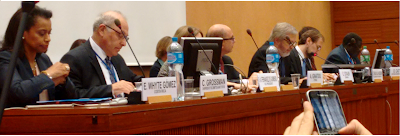On May 11th
IIMA attended the event entitled “What’s trust got to do with Migration?” at
the UN Library, in which the guests shared their personal stories, each
focusing on issues related to migration and the importance of trust-building.
The
initiative was opened by Cornelio Sommaruga, Honorary President of Initiative
of Change International (IofC) who stated the importance of consolidating and
revaluating human security relating to integration in the global phenomenon of
migration.
This
initiative was animated by the participation of Leonard Doyle, Spokesperson for
the International Organization for Migration (IOM); Melissa Fleming, Chief Spokesperson
for the United Nations High Commissioner for Refugees; Jens Wihelmsen Member of
IofC Norway; Imad Karam, Executive Director of IofC International; Huruy
Gulbet, Eritrean Refugee, student in Geneva.














